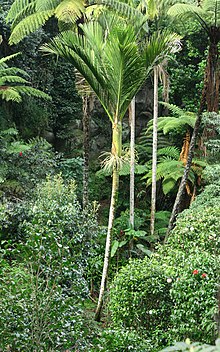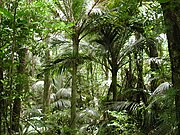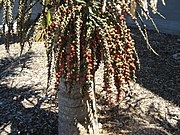Rhopalostylis sapida
| Nikau | |
|---|---|

| |
| Scientific classification | |
| Kingdom: | Plantae |
| Clade: | Tracheophytes |
| Clade: | Angiosperms |
| Clade: | Monocots |
| Clade: | Commelinids |
| Order: | Arecales |
| Family: | Arecaceae |
| Genus: | Rhopalostylis |
| Species: | R. sapida
|
| Binomial name | |
| Rhopalostylis sapida | |
Rhopalostylis sapida, the nikau (Māori: nīkau) is a palm tree endemic to New Zealand. It is the only palm tree to grow there. It also does not grow naturally anywhere else in the world.[1]
Nīkau is a Māori word. In the languages of the Pacific tropics, it means the leaves of a coconut palm.[2]
The Maori had many uses for the nīkau palm. The bases of the inner leaves and the young flowers were eaten raw or cooked. Food was wrapped in the leaves for cooking. The old tough leaves were used to make baskets, floor rugs and waterproof thatched roofs for buildings.[3]
Natural location
[change | change source]
The nīkau palm lives along the coast and lowland forests on the North Island and on the South Island. It lives where there is humidity. It is the world's most southern palm at 44° 18'S latitude.[3]
Description
[change | change source]The nīkau grows tall with a wide, green trunk which has grey-green leaf scars. The trunk is topped by a smooth, bulging crown of fronds (leaves). The flowers are coloured lilac to pink. The fruit is circular or oblong and is red when ripe. The nīkau has flowers between November and April (summer). The fruit ripens from February to November and is a favourite food for the native wood pigeon.
Caring for the palm
[change | change source]
The nīkau makes an excellent potted plant, and is quite healthy. It is slow-growing. It grows easily from a seed if the fruit is soaked in water for a few days and then gently scrubbed to remove the skin. The seed will then germinate in sealed plastic bags in part shade. Later, they can be planted in deep pots.
The nīkau lives well in cool temperatures. In New Zealand, it does not get exposed to freezing weather. It can survive a few degrees of frost. It is hurt most by a sudden large drop in temperature even above freezing. It does well in areas with a mild Mediterranean climate.
References
[change | change source]- ↑ Charles S. Jackson (1999). "Nikau Palm Blues". The European Palm Society. Retrieved 13 July 2015.
- ↑ "Protoform: NII-KAU [CE] Coconut frond". Polynesian Lexicon Project Online. Retrieved 13 July 2015.
- ↑ 3.0 3.1 Esler, A. E. 'The Nikau Palm', New Zealand's Nature Heritage, Vol.2 Part 19 p.532, 1974
Other websites
[change | change source]- "Rhopalostylis sapida". New Zealand Plant Conservation Network. Archived from the original on 7 May 2012. Retrieved 13 July 2015.
- "Rhopalostylis sapida". Flora of New Zealand. Retrieved 13 July 2015.
- New Zealand native plant website: Rhopalostylis sapida Archived 2014-08-14 at the Wayback Machine

